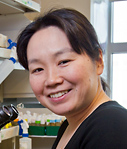Yukiko Yamashita of the Life Sciences Institute is one of 27 biomedical researchers named as Howard Hughes Medical Institute investigators.

Yamashita
HHMI provides flexible support on renewable five-year appointments to allow scientists to move their research in creative new directions. This year, 1,155 applicants applied to be investigators. Those selected represent 19 institutions from across the United States.
Yamashita, a research assistant professor at LSI and assistant professor of cell and developmental biology in the Medical School, joins five other current U-M faculty members — including one from LSI — on the list of HHMI investigators.
A central question fascinates Yamashita: When stem cells divide, what determines which daughter cell will remain a stem cell and which will differentiate into another tissue type?
Maintaining a balance between stem and differentiating cell populations during so-called asymmetrical cell division is critical because an excess of stem cells can lead to cancerous tumor growth, whereas too many differentiated cells can deplete the stem cell pool and reduce the capacity for tissue regeneration.
“I’m looking forward to designing and carrying out experiments that may yield new examples of asymmetrical stem cell division and perhaps finding unexpected links between those divisions and biological process,” Yamashita said.
HHMI provides support for approximately 330 Hughes investigators and members of their research teams. Of the current investigators, 164 are members of the National Academy of Sciences and 15 are Nobel laureates.
“HHMI has a very simple mission,” said HHMI President Robert Tjian. “We find the best original-thinking scientists and give them the resources to follow their instincts in discovering basic biological processes that may one day lead to better medical outcomes. This is a very talented group of scientists. And while we cannot predict where their research will take them, we’re eager to help them move science forward.”

